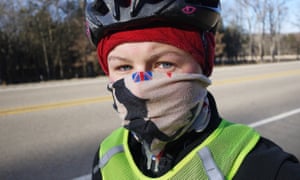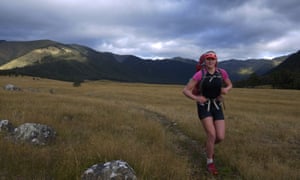
Anna McNuff didn’t plan to be an adventurer. In fact as a young adult, and the daughter of two Olympians, she embraced competitive rowing; every training session set, every month timetabled in advance.
Yet after winning a bronze medal for Team GB in the 2007 European championships, McNuff made the decision to hang up her oars and enter the equally fast-paced waters of corporate life via a graduate scheme in marketing at a major telecommunications company.
This move felt exciting and full of promise. It was, McNuff assumed, her first big adventure – but by year five, the sheen had worn right off. “I started to feel a bit caged by the rules and regulations. I wanted to feel passionate about what I was doing again and I had a big idea,” she says.
After nine months of full-time work combined with an exhausting weekend job working in a bike store, McNuff left corporate life to begin the challenge of cycling 11,000 miles through all 50 states of America – from Alaska to Hawaii – within six months.
“I’d never felt so much like myself as on that trip – and subsequent ones,” she says. “Riding down the big road, wind everywhere, singing at the top of my lungs. I was so happy, creative and free.” She felt like she had a purpose, and took time in each state to visit schools and talk to pupils, hoping to educate and inspire the next generation about the importance of sport and adventure.
The trip itself was, of course, full of challenges. But overall it was a delight – coming home was not easy. “I had no idea about the post-adventure blues,” says McNuff. “It was such a huge shock. The initial novelty of seeing friends and family fell away fast. I just felt so odd. So alien. On the trip I would been allowed to spread my wings so wide, but going back into an office everything was too narrow. I felt really uncomfortable.”
Two weeks after cycling up the longest paved road ascent in the world – Mount Haleakala in Hawaii – McNuff found herself back in London lining up Powerpoint presentations. What had happened to her, she wondered? It was becoming very clear that this working environment was not sustainable; she wasn’t really interested in marketing and another adventure was already playing on her mind. She wanted to run the length of New Zealand, a six-month trip even more ambitious than the previous one, particularly since McNuff suffered injuries from five kilometre runs three times per week.

It took five months and a lot more saving, but McNuff’s Antipodean adventure – 1,911 miles along New Zealand’s Te Araroa trail – began in January 2015. She was travelling alone for 148 days. “It was the hardest thing I’ve ever done,” she says. “I broke bits of my body, cried loads and experienced loneliness like I never have before. But I also reconnected with the person I was supposed to be.”
At the end of this very long run, McNuff returned to England where she sat in a coffee shop and placed Post-it notes around her with all the things she wanted to do in the next five years. Not one of them related to her supposed career. How could she possibly spend so much of her life doing something that held no appeal? She asked herself. Her plan to split her year down the middle between high-earning office work and intrepid trips abroad no longer seemed feasible.
“Finishing an adventure is like a breakup,” McNuff explains. “The first stage is relief. Then there’s hyperactivity – I could hardly sit still for the first two weeks afterwards – and then a period of high confidence and a desire to move forward.”
But then the depression hits. “This time it took around three months after returning home for McNuff to fully feel its impact: six weeks of uncontrollable crying (“cycling down the Edgware Road with tears pouring down my face”) feeling totally alone and like she didn’t want to get out of bed. “I had spent so long wishing for the challenge to be over, looking forward to the triumph at the end, but then I just felt lost. I had to process it all, realise that it was gone, accept it and grieve it.”
Only after experiencing the full impact of her adventures, with all the stress, elation and exhaustion that ensued, was McNuff able to move forward. In January this year she decided to carve out a different kind of life for herself. This involves writing, public speaking and adventures, as well as the odd stint in an office which, she has decided, doesn’t make her a fraud.

“There isn’t only one way to be an adventurer,” is one thing she’s learned, but an even bigger lesson surrounds viewpoint. Going into remote places and extreme situations changes a person, such as in Colorado where, during a huge flood, McNuff had to pull a couple out of a river after their car flipped off the road. “People had died and lost their homes,” she says. “It puts the panic, worry and anger that office workers bring into meetings into stark relief. I guess my adventures accelerated the emotional ageing process – now I have a much greater range of feelings and a better sense of perspective.”
But adventure doesn’t always have to mean epic, as Mcnuff is keen to make clear. “Some of my favourite trips have been only a few days long – like the time a friend and I tried to rollerblade 100 miles around Amsterdam, or when I decided to run the length of Hadrian’s Wall dressed as a Roman soldier!” This October, however, McNuff will be going big, with a bike ride across the Andes via as many peaks as possible (approximately 89,000 metres of ascent).
Yet whatever your goal – be it humble or grandiose – be sure to ignore the patronising, negative types – the “dream-dumpers” who try to talk you out of your dreams or tell you they are impossible. “Dispense with what others might think of you, and remember this is your life,” she advises. “Know that fear is an emotion to be embraced and understood, not one to shy away from.”
Source: Read Full Article